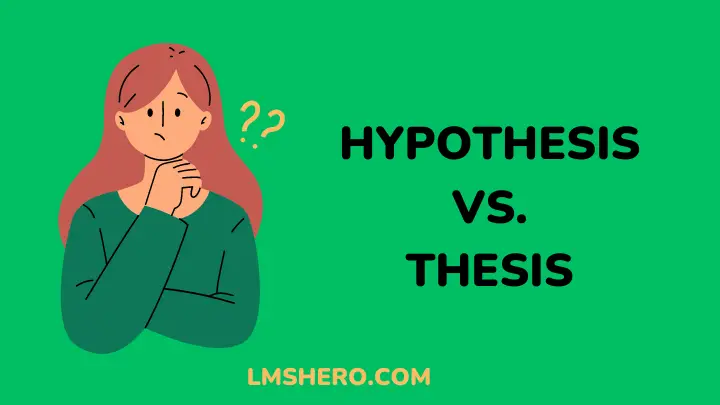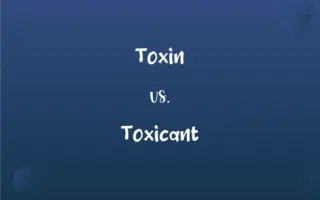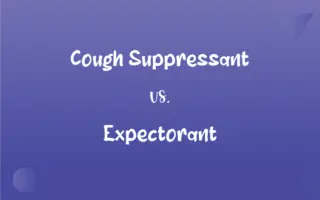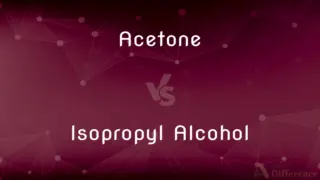

The Real Differences Between Thesis and Hypothesis (With table)
A thesis and a hypothesis are two very different things, but they are often confused with one another. In this blog post, we will explain the differences between these two terms, and help you understand when to use which one in a research project.
As a whole, the main difference between a thesis and a hypothesis is that a thesis is an assertion that can be proven or disproven, while a hypothesis is a statement that can be tested by scientific research.
We probably need to expand a bit on this topic to make things clearer for you, let’s start with definitions and examples.
Definitions
As always, let’s start with the definition of each term before going further.

A thesis is a statement or theory that is put forward as a premise to be maintained or proved. A thesis statement is usually one sentence, and it states your position on the topic at hand.
A hypothesis is a statement that can be tested by scientific research. A hypothesis is usually based on observations, and it seeks to explain how these observations fit together.
You may also like:
- Differences between Hardcover and Paperback
- Differences between Average and Median
- Differences between Embassy and Consulate
The best way to understand the slight difference between those terms, is to give you an example for each of them.
If you are writing a paper about the effects of climate change on the environment, your thesis might be “Climate change is causing irreparable damage to our planet, and we must take action to prevent further damage”.
If you observe that the leaves on a tree are turning yellow, your hypothesis might be “The tree is sick”. It’s the starting point of experimental research: what can you do then to prove if your hypothesis is right or wrong?
If your hypothesis is correct, then further research should be able to confirm it. However, if your hypothesis is incorrect, research will disprove it. Either way, a hypothesis is an important part of the scientific process.
Taking a look at the etymology of words can help you to remember which one to use is each case.
The word “thesis” comes from the Greek θέσις, meaning “something put forth”, and refers to an intellectual proposition.
The word “hypothesis” comes from the Greek words “hupo,” meaning “under”, and “thesis” that we just explained.
This reflects the fact that a hypothesis is an educated guess, based on observations.
Argumentation vs idea
Hypothesis are generally base on simple observation, while thesis imply that more work has been done on the topic.
A thesis is usually the result of extensive research and contemplation, and seeks to prove a point or theory.
A hypothesis is only a statement that need to be tested by observation or experimentation.
5 mains differences between thesis and hypothesis
Thesis and hypothesis are different in several ways, here are the 5 keys differences between those terms:
- A thesis is a statement that can be argued, while a hypothesis cannot be argued.
- A thesis is usually longer than a hypothesis.
- A thesis is more detailed than a hypothesis.
- A thesis is based on research, while a hypothesis may or may not be based on research.
- A thesis must be proven, while a hypothesis need not be proven.
So, in short, a thesis is an argument, while a hypothesis is a prediction. A thesis is more detailed and longer than a hypothesis, and it is based on research. Finally, a thesis must be proven, while a hypothesis does not need to be proven.
Is there a difference between a thesis and a claim?
Yes, there is a difference between a thesis and a claim. A thesis statement is usually one sentence that states your main argument, while a claim is a more general statement that can be supported by evidence.
Is a hypothesis a prediction?
No, a hypothesis is not a prediction. A prediction is a statement about what you think will happen in the future, whereas a hypothesis is a statement about what you think is causing a particular phenomenon.
What’s the difference between thesis and dissertation?
A thesis is usually shorter and more focused than a dissertation, and it is typically achieved in order to earn a bachelor’s degree. A dissertation is usually longer and more comprehensive, and it is typically completed in order to earn a master’s or doctorate degree.
What is a good thesis statement?
A good thesis statement is specific, debatable, and supports the main point of the paper. It should be clear what the researcher position is, and what evidence they will use to support it.
Thanks for reading! I hope this post helped clear up the differences between thesis and hypothesis. Like that kind of comparison? These other articles might be interesting for you:
- What is the Difference between Mandate and Law?
- The 6 Differences Between Space And Universe
- What’s the Difference Between Cosmology and Astrology?
I am very curious and I love to learn about all types of subjects. Thanks to my experience on the web, I share my discoveries with you on this site :)
Similar Posts

What’s The Difference Between a Rule and a Guideline?
We tend to use both words in the same situation, but rules and guidelines have different definitions and usage cases. I’ll try to make this clearer for you in this article. The main difference between rules and guidelines is that rules are enforced by authorities while guidelines are mostly recommendations, there is no consequence in…

What’s the Difference between a Bridge and a Viaduct?
Here is another difference that seems minimal when speaking or writing, but do you know the real difference?Could you explain to someone in which cases he should use “bridge” or “viaduct”? As a general rule, a bridge is a small structure, built to avoid an obstacle (valley, river, etc.). A viaduct is generally a bigger…

Missile Vs Artillery: What’s the exact difference? (Table)
What’s the difference between an artillery shell and a missile? This is a question that often confuses people. The two weapons systems are very similar, but there are some key differences. In this blog post, we will discuss the differences between artillery and missiles, and explain which one is better for your needs. The key…

The True Differences Between a Monarchy and an Empire
We learn this in school, but we teach us so many things in a short period of time and with so little experience of the real world (especially in politics), that it quickly becomes overwhelming. The differences between monarchy and empire weren’t clear for me, so I did the research and can now share what…

8 Main Differences Between North Korea And South Korea
You most likely already know that even though North and South Korea are neighbors, the life in these two countries is quite different. But how different exactly, and where does this come from? I’ll answer all these questions in this article. The main difference between North and South Korea is that North Korea is a…

Top 5 Differences Between Wizards And Warlocks (with table)
There is a lot of debate over whether wizards and warlocks are actually different. Some people say that they are just two names for the same thing, while others claim that there are key differences between the two. In this blog post, we will explore seven of the most important distinctions between wizards and warlocks….
Thesis Vs Hypothesis: Understanding The Basis And The Key Differences

Hypothesis vs. thesis: They sound similar and seem to discuss the same thing. However, these terms have vastly different meanings and purposes. You may have encountered these concepts in school or research, but understanding them is key to executing quality work.
As an inexperienced writer, the thought of differentiating between hypotheses and theses might seem like an insurmountable task. Fortunately, I am here to help.
In this article, I’ll discuss hypothesis vs. thesis, break down their differences, and show you how to apply this knowledge to create quality written works. Let’s get to it!
Thesis vs. Hypothesis: Understanding the Basis
The power of a thesis.
A thesis is a foundational element in academic writing and research. It also serves as the linchpin of your argument, encapsulating the central idea or point you aim to prove or disprove throughout your work.
A thesis statement is typically found at the end of the introduction in an essay or research paper, succinctly summarizing the overarching theme.
Crafting a strong thesis
- Understand the research: Begin by thoroughly comprehending the requirements and objectives of your research. Having a clear understanding of the topic you are arguing or analyzing is crucial.
- Choose a clear topic: Choose one that interests you and aligns with the research’s scope. Clarity and focus are essential in crafting a strong thesis.
- Conduct research: Gather relevant information and sources to develop a deep understanding of your topic. This research will provide the evidence and context for your thesis.
- Identify your position: Determine your stance or position on the topic. Your thesis should express a clear opinion or argument you intend to support throughout your work.
- Narrow down your focus: Refine your topic and thesis more precisely. Avoid broad, generalized statements. Instead, aim for a concise and specific thesis that addresses a particular aspect of the topic.
- Test for validity: Ensuring that you can argue and provide evidence to support your thesis is crucial. It should not be a self-evident or universally accepted fact.
- Write and revise: Craft your thesis statement as a clear, concise sentence summarizing your main argument. Revise and refine it as needed to improve its clarity and strength.
Remember that a strong thesis serves as the foundation for your entire piece of writing, guiding your readers and keeping your work focused and organized.
Hypothesis: The scientific proposition
In contrast, a hypothesis is a tentative proposition or educated guess. It is the initial step in the scientific method, where researchers formulate a hunch to test their assumptions and theories.
A hypothesis is an assertion that can be proven or disproven through experimentation and observation.
Formulating a hypothesis
- Identify the research question: Identify the research question or problem you want to investigate. Clearly define the scope and boundaries of your inquiry.
- Review existing knowledge: Conduct a literature review to gather information about the topic. Understand the existing body of knowledge and literature in the field.
- Formulate a tentative explanation: Based on your research and understanding of the topic, create a tentative explanation or educated guess about the phenomenon you are studying. This should be a statement that can be falsifiable through experimentation or observation.
- Make it testable: Ensure that your hypothesis is testable and falsifiable. In other words, designing experiments or gathering data supporting or refuting your hypothesis should be possible.
- Specify variables and predictions: Clearly define the variables involved in your hypothesis and make predictions about how changes in these variables will affect the outcome. It also helps in designing experiments and collecting data to test your hypothesis.
Formulating a hypothesis is a crucial step in the scientific method since it directs research and guides efforts to validate theories or uncover new knowledge.
Key Differences Between Thesis vs. Hypothesis

1. Nature of statement
- Thesis: A thesis presents a clear and definitive statement or argument that summarizes the main point of a research paper or essay.
- Hypothesis: A hypothesis is a tentative and testable proposition or educated guess that suggests a possible outcome of an experiment or research study.
- Thesis: The primary purpose of a thesis is to provide a central focus and roadmap for the entire piece of academic writing.
- Hypothesis: The main purpose of a hypothesis is to guide scientific research by proposing a specific prediction that can be tested and validated.
3. Testability
- Thesis: A thesis is not typically subjected to experimentation but serves as a point of argumentation and discussion.
- Hypothesis: A hypothesis, on the other hand, is explicitly designed for testing through experimentation or observation, making it a fundamental part of the scientific method.
4. Research stage
- Thesis: A thesis is usually formulated after extensive research and analysis as a conclusion or summary of findings.
- Hypothesis: A hypothesis is formulated at the beginning of a research project to establish a basis for experimentation and data collection.
- Thesis: A thesis typically encompasses the entire research paper or essay, providing an overarching theme throughout the work.
- Hypothesis: A hypothesis addresses a specific aspect of a research question or problem, guiding the focus of experiments or investigations.
6. Examples
- Thesis: Example of a thesis statement: “The impact of climate change on marine ecosystems is irreversible.”
- Hypothesis: Example of a hypothesis: “If increased temperatures continue, coral reefs will experience bleaching events.”
- Thesis: The thesis represents a conclusion or a well-supported argument and does not aim to be proven or disproven.
- Hypothesis: On the other hand, a hypothesis aims to be tested and validated through empirical evidence. Besides, it can be proven true or false based on the results of experiments or observations.
These differences highlight the distinct roles that the thesis and hypothesis play in academic writing and scientific research, with one providing a point of argumentation and the other guiding the scientific inquiry process.
Can a hypothesis become a thesis?
Yes. A hypothesis can develop into a thesis as it accumulates substantial evidence through research.
Do all research papers require a thesis?
Not necessarily. While most academic papers benefit from a clear thesis, some, like purely descriptive papers, may follow a different structure.
Can a thesis be proven wrong?
Yes. The purpose of a thesis is not only to prove but also to encourage critical analysis. It can be proven wrong with compelling counterarguments and evidence.
How long should a thesis statement be?
A thesis statement should be concise and to the point, typically one or two sentences.
Is a hypothesis only used in scientific research?
Although hypotheses are typically linked to scientific research, they can also be used to verify assumptions and theories in other areas.
Can a hypothesis be vague?
No. When creating a hypothesis, it’s important to make it clear and able to be tested. Developing experiments and making conclusions based on the results can be difficult if the hypothesis needs clarification.
Final Thoughts
In conclusion, understanding the differences between a hypothesis and a thesis is vital to crafting successful research projects and academic papers. While they may seem interchangeable at first glance, these two concepts serve distinct purposes in the research process.
A hypothesis serves as a testable prediction or explanation, whereas a thesis is the central argument of a paper or project. Your work can lack clarity and purpose without understanding the difference.
So, the next time you embark on a research project, take the time to ensure that you understand the fundamental difference between a hypothesis and a thesis. Doing so can lead to more focused, meaningful research that advances knowledge and understanding in your field.
You can also learn more about how long a thesis statement should be .
Thanks for reading.
You may also like:
- Discover Where Thesis Statement Is Located In An Essay
- Master’s Thesis Length: How Long Should A Master’s Thesis Be?
- How Long Is A Thesis Paper: Factors Involved & Formatting Tips
- Moral Argument – Examples And Benefits
- Examples of Work Ethic: Everyone Loves a Good Employee
People Also Read:

Why Do Waiters Get Paid So Little [+ How To Make More Money]

Navigating Workplace Norms: Can You Email A Resignation Letter?

Difference Between Roles And Responsibilities

Does Suspension Mean Termination?

Moral Claim: Definition, Significance, Contemporary Issues, & Challenges

Why Can’t You Flush The Toilet After A Drug Test?

Home » Education » Difference Between Thesis and Hypothesis
Difference Between Thesis and Hypothesis
Main difference – thesis vs hypothesis .
Thesis and hypothesis are two common terms that are often found in research studies. Hypothesis is a logical proposition that is based on existing knowledge that serves as the starting point of an investigation. A thesis is a statement that is put forward as a premise to be maintained or proved. The main difference between thesis and hypothesis is that thesis is found in all research studies whereas a hypothesis is mainly found in experimental quantitative research studies.
This article explains,
1. What is a Thesis? – Definition, Features, Function
2. What is a Hypothesis? – Definition, Features, Function

What is a Thesis
The word thesis has two meanings in a research study. Thesis can either refer to a dissertation or a thesis statement. Thesis or dissertation is the long essay or document that consists of the research study. Thesis can also refer to a theory or statement that is used as a premise to be maintained or proved.
The thesis statement in a research article is a sentence found at the beginning of the paper that presents the main argument of the paper. The rest of the document will gather, organize and present evidence to support this argument. The thesis statement will basically present the topic of the paper and indicate what position the researcher is going to take in relation to this topic. A thesis statement can generally be found at the end of the first paragraph (introductory paragraph) of the paper.

What is a Hypothesis
A hypothesis is a logical assumption based on available evidence. Hypothesis is defined as “a supposition or proposed explanation made on the basis of limited evidence as a starting point for further investigation” in the Oxford dictionary and as “an idea or theory that is not proven but that leads to further study or discussion” in the Merriam-Webster dictionary. In simple words, it is an educated guess that is not proven with concrete scientific evidence. Once it is scientifically tested and proven, it becomes a theory. However, it is important to note that a hypothesis can be accurate or inaccurate.
Hypotheses are mostly used in experiments and research studies. However, hypotheses are not used in every research study. They are mostly used in quantitative research studies that deal with experiments. Hypotheses are often used to test a specific model or theory . They can be used only when the researcher has sufficient knowledge about the subject since hypothesis are always based on the existing knowledge. Once the hypothesis is built, the researcher can find and analyze data and use them to prove or disprove the hypothesis.

Thesis: A thesis is a “statement or theory that is put forward as a premise to be maintained or proved” or a “long essay or dissertation involving personal research, written by a candidate for a university degree” (Oxford dictionary).
Hypothesis: A hypothesis is “a supposition or proposed explanation made on the basis of limited evidence as a starting point for further investigation” (Oxford dictionary).
Thesis: Thesis statement can be found in all research papers.
Hypothesis: Hypotheses are usually found in experimental quantitative research studies.
Thesis: Thesis statement may explain the hypothesis and how the researcher intends to support it.
Hypothesis: Hypothesis is an educated guess based on the existing knowledge.
Image Courtesy:
“Master’s Thesis” by Henri Sivonen (CC BY 2.0) via Flickr
“Colonial Flagellate Hypothesis” By Katelynp1 – Own work (CC BY-SA 3.0) via Commons Wikimedia
About the Author: Hasa
Hasanthi is a seasoned content writer and editor with over 8 years of experience. Armed with a BA degree in English and a knack for digital marketing, she explores her passions for literature, history, culture, and food through her engaging and informative writing.
You May Also Like These
Leave a reply cancel reply.

- Richard G. Trefry Library
- Writing & Citing
Q. What is the difference between a thesis statement and a hypothesis statement?

- Course-Specific
- Textbooks & Course Materials
- Tutoring & Classroom Help
- 42 Formatting
- 4 Information Literacy
- 13 Plagiarism
- 23 Thesis/Capstone/Dissertation
Answered By: APUS Librarians Last Updated: Apr 15, 2022 Views: 126589
Both the hypothesis statement and the thesis statement answer a research question.
- A hypothesis is a statement that can be proved or disproved. It is typically used in quantitative research and predicts the relationship between variables.
- A thesis statement is a short, direct sentence that summarizes the main point or claim of an essay or research paper. It is seen in quantitative, qualitative, and mixed methods research. A thesis statement is developed, supported, and explained in the body of the essay or research report by means of examples and evidence.
Every research study should contain a concise and well-written thesis statement. If the intent of the study is to prove/disprove something, that research report will also contain a hypothesis statement.
NOTE: In some disciplines, the hypothesis is referred to as a thesis statement! This is not accurate but within those disciplines it is understood that "a short, direct sentence that summarizes the main point" will be included.
For more information, see The Research Question and Hypothesis (PDF file from the English Language Support, Department of Student Services, Ryerson University).
How do I write a good thesis statement?
How do I write a good hypothesis statement?
- Share on Facebook
Was this helpful? Yes 115 No 63
writing tutor
Related topics.
Need personalized help? Librarians are available 365 days/nights per year! See our schedule.

Learn more about how librarians can help you succeed.

PSC 352: Introduction to Comparative Politics
- Getting Started
- Comparative Politics Overview
- Current World/Political News Feeds
- Choose a country
What is the difference between a thesis & a hypothesis?
- Find Books/eBooks
- Find Articles, Reports & Documents
- Find Statistics
- Find Poll & Survey Results
- Evaluate Your Sources
- Cite Your Sources
B oth the hypothesis statement and the thesis statement answer the research question of the study. When the statement is one that can be proved or disproved, it is an hypothesis statement. If, instead, the statement specifically shows the intentions/objectives/position of the researcher, it is a thesis statement.
A hypothesis is a statement that can be proved or disproved. It is typically used in quantitative research and predicts the relationship between variables.
A thesis statement is a short, direct sentence that summarizes the main point or claim of an essay or research paper. It is seen in quantitative, qualitative, and mixed methods research. A thesis statement is developed, supported, and explained in the body of the essay or research report by means of examples and evidence.
Every research study should contain a concise and well-written thesis statement. If the intent of the study is to prove/disprove something, that research report will also contain an hypothesis statement.
Jablonski , Judith. What is the difference between a thesis statement and an hypothesis statement? Online Library. American Public University System. Jun 16, 2014. Web. http://apus.libanswers.com/faq/2374
Let’s say you are interested in the conflict in Darfur, and you conclude that the issues you wish to address include the nature, causes, and effects of the conflict, and the international response. While you could address the issue of international response first, it makes the most sense to start with a description of the conflict, followed by an exploration of the causes, effects, and then to discuss the international response and what more could/should be done.
This hypothetical example may lead to the following title, introduction, and statement of questions:
Conflict in Darfur: Causes, Consequences, and International Response This paper examines the conflict in Darfur, Sudan. It is organized around the following questions: (1) What is the nature of the conflict in Darfur? (2) What are the causes and effects of the conflict? (3) What has the international community done to address it, and what more could/should it do?
Following the section that presents your questions and background, you will offer a set of responses/answers/(hypo)theses. They should follow the order of the questions. This might look something like this, “The paper argues/contends/ maintains/seeks to develop the position that...etc.” The most important thing you can do in this section is to present as clearly as possible your best thinking on the subject matter guided by course material and research. As you proceed through the research process, your thinking about the issues/questions will become more nuanced, complex, and refined. The statement of your theses will reflect this as you move forward in the research process.
So, looking to our hypothetical example on Darfur:
The current conflict in Darfur goes back more than a decade and consists of fighting between government-supported troops and residents of Darfur. The causes of the conflict include x, y, and z. The effects of the conflict have been a, b, and c. The international community has done 0, and it should do 1, 2, and 3.
Once you have setup your thesis you will be ready to begin amassing supporting evidence for you claims. This is a very important part of the research paper, as you will provide the substance to defend your thesis.
- << Previous: Choose a country
- Next: Find Books/eBooks >>
- Last Updated: Feb 28, 2024 3:19 PM
- URL: https://libguides.mssu.edu/PSC352
This site is maintained by the librarians of George A. Spiva Library . If you have a question or comment about the Library's LibGuides, please contact the site administrator .
Thesis vs. Hypothesis: What's the Difference?
Key Differences
Comparison chart, verification, thesis and hypothesis definitions, is a thesis subjective, can a thesis be a question, who verifies a hypothesis, who writes a thesis, can a hypothesis be proven, does a thesis require research, what's a thesis statement, what forms a good hypothesis, is a hypothesis always true, can a thesis change during research, how broad can a hypothesis be, is defending a thesis challenging, is every thesis published, how long is a thesis, what if research contradicts my hypothesis, why is a thesis important, are hypotheses guaranteed to progress science, is there risk in a hypothesis, can a hypothesis lead to a theory, what's a null hypothesis.

Trending Comparisons

Popular Comparisons


New Comparisons

Have a language expert improve your writing
Run a free plagiarism check in 10 minutes, generate accurate citations for free.
- Knowledge Base
Methodology
- How to Write a Strong Hypothesis | Steps & Examples
How to Write a Strong Hypothesis | Steps & Examples
Published on May 6, 2022 by Shona McCombes . Revised on November 20, 2023.
A hypothesis is a statement that can be tested by scientific research. If you want to test a relationship between two or more variables, you need to write hypotheses before you start your experiment or data collection .
Example: Hypothesis
Daily apple consumption leads to fewer doctor’s visits.
Table of contents
What is a hypothesis, developing a hypothesis (with example), hypothesis examples, other interesting articles, frequently asked questions about writing hypotheses.
A hypothesis states your predictions about what your research will find. It is a tentative answer to your research question that has not yet been tested. For some research projects, you might have to write several hypotheses that address different aspects of your research question.
A hypothesis is not just a guess – it should be based on existing theories and knowledge. It also has to be testable, which means you can support or refute it through scientific research methods (such as experiments, observations and statistical analysis of data).
Variables in hypotheses
Hypotheses propose a relationship between two or more types of variables .
- An independent variable is something the researcher changes or controls.
- A dependent variable is something the researcher observes and measures.
If there are any control variables , extraneous variables , or confounding variables , be sure to jot those down as you go to minimize the chances that research bias will affect your results.
In this example, the independent variable is exposure to the sun – the assumed cause . The dependent variable is the level of happiness – the assumed effect .
Prevent plagiarism. Run a free check.
Step 1. ask a question.
Writing a hypothesis begins with a research question that you want to answer. The question should be focused, specific, and researchable within the constraints of your project.
Step 2. Do some preliminary research
Your initial answer to the question should be based on what is already known about the topic. Look for theories and previous studies to help you form educated assumptions about what your research will find.
At this stage, you might construct a conceptual framework to ensure that you’re embarking on a relevant topic . This can also help you identify which variables you will study and what you think the relationships are between them. Sometimes, you’ll have to operationalize more complex constructs.
Step 3. Formulate your hypothesis
Now you should have some idea of what you expect to find. Write your initial answer to the question in a clear, concise sentence.
4. Refine your hypothesis
You need to make sure your hypothesis is specific and testable. There are various ways of phrasing a hypothesis, but all the terms you use should have clear definitions, and the hypothesis should contain:
- The relevant variables
- The specific group being studied
- The predicted outcome of the experiment or analysis
5. Phrase your hypothesis in three ways
To identify the variables, you can write a simple prediction in if…then form. The first part of the sentence states the independent variable and the second part states the dependent variable.
In academic research, hypotheses are more commonly phrased in terms of correlations or effects, where you directly state the predicted relationship between variables.
If you are comparing two groups, the hypothesis can state what difference you expect to find between them.
6. Write a null hypothesis
If your research involves statistical hypothesis testing , you will also have to write a null hypothesis . The null hypothesis is the default position that there is no association between the variables. The null hypothesis is written as H 0 , while the alternative hypothesis is H 1 or H a .
- H 0 : The number of lectures attended by first-year students has no effect on their final exam scores.
- H 1 : The number of lectures attended by first-year students has a positive effect on their final exam scores.
If you want to know more about the research process , methodology , research bias , or statistics , make sure to check out some of our other articles with explanations and examples.
- Sampling methods
- Simple random sampling
- Stratified sampling
- Cluster sampling
- Likert scales
- Reproducibility
Statistics
- Null hypothesis
- Statistical power
- Probability distribution
- Effect size
- Poisson distribution
Research bias
- Optimism bias
- Cognitive bias
- Implicit bias
- Hawthorne effect
- Anchoring bias
- Explicit bias
A hypothesis is not just a guess — it should be based on existing theories and knowledge. It also has to be testable, which means you can support or refute it through scientific research methods (such as experiments, observations and statistical analysis of data).
Null and alternative hypotheses are used in statistical hypothesis testing . The null hypothesis of a test always predicts no effect or no relationship between variables, while the alternative hypothesis states your research prediction of an effect or relationship.
Hypothesis testing is a formal procedure for investigating our ideas about the world using statistics. It is used by scientists to test specific predictions, called hypotheses , by calculating how likely it is that a pattern or relationship between variables could have arisen by chance.
Cite this Scribbr article
If you want to cite this source, you can copy and paste the citation or click the “Cite this Scribbr article” button to automatically add the citation to our free Citation Generator.
McCombes, S. (2023, November 20). How to Write a Strong Hypothesis | Steps & Examples. Scribbr. Retrieved March 30, 2024, from https://www.scribbr.com/methodology/hypothesis/
Is this article helpful?
Shona McCombes
Other students also liked, construct validity | definition, types, & examples, what is a conceptual framework | tips & examples, operationalization | a guide with examples, pros & cons, unlimited academic ai-proofreading.
✔ Document error-free in 5minutes ✔ Unlimited document corrections ✔ Specialized in correcting academic texts

Thesis vs. Hypothesis — What's the Difference?
Difference Between Thesis and Hypothesis
Table of contents, key differences, comparison chart, position in study, compare with definitions, common curiosities, what happens if a hypothesis is refuted, is a thesis always present in an essay, is a phd dissertation a thesis, what follows after stating a thesis in an essay, can a hypothesis turn into a theory, can a hypothesis be proven true permanently, is the thesis statement the same as a thesis, can a single research paper have multiple theses, is a hypothesis an opinion, are hypotheses only used in scientific fields, who presents a thesis, how specific should a hypothesis be, does a thesis require evidence, why are hypotheses essential in science, share your discovery.

Author Spotlight
Popular Comparisons

Trending Comparisons

New Comparisons

Trending Terms

- Have your assignments done by seasoned writers. 24/7
- Contact us:
- +1 (213) 221-0069
- [email protected]

Thesis vs Hypothesis vs Theory: the Differences and examples
Many students may have a hard time understanding the differences between a thesis, a hypothesis, and a theory. It is important to understand their differences. Such an understanding will be instrumental.
More so, when writing complex research papers that require a thesis that has a hypothesis and utilizes theories. We have gathered from responses of our college writing service that the difference between the three is confusing.

That being said, this article is meant to explain the differences between a thesis, a hypothesis, and a theory.
Difference between Hypothesis and Thesis
There are major differences between hypothesis and thesis. While they seem to be related on the face, their differences are huge both in concept and practice.
A hypothesis is a proposed explanation of something or a phenomenon. A scientific hypothesis uses a scientific method that requires any hypothesis to be tested. As such, scientists and researchers base their hypothesis on observations that have been previously made and that which cannot be explained by the available or prevailing scientific theories.
From the definition of a hypothesis, you can see that theories must be included in any scientific method. This is the reason why this article tries to differentiate a thesis, a hypothesis, and a theory.
Moving forward, a thesis can be defined as a written piece of academic work that is submitted by students to attain a university degree. However, on a smaller scale, there is something that is referred to as a thesis statement.
This is written at the introduction of a research paper or essay that is supported by a credible argument. The link between a hypothesis and thesis is that a thesis is a distinction or an affirmation of the hypothesis.
What this means is that whenever a research paper contains a hypothesis, there should be a thesis that validates it.
What is a Hypothesis?
A hypothesis can be defined as the proposed or suggested explanation for an occurrence, something, or a phenomenon. It should be testable through scientific methods. The reason why scholarly works should have a hypothesis is that the observed phenomena could not be explained using the prevailing scientific theories hence the reason why it should be tested.
Testing the hypothesis may result in the development of new or improved scientific theories that are beneficial to the discipline and society in general.
What is a Thesis?
A thesis is a written piece of academic work that is submitted by students to attain a university degree. When a thesis is used as a stand-alone word, it denotes academic papers written by university students. It is mostly written by those pursuing postgraduate degrees, at the end of their courses. They demonstrate their proficiency in their disciplines and the topics they have selected for research.
However, when a thesis is used to refer to a statement, it denotes the statement that is written at the introduction of a research paper or essay. A thesis is supported by a credible argument.
Every research paper must have a thesis statement that acts as a guide to what the research will be all about. It is possible to receive very poor grades or even score a zero if your research paper lacks the thesis statement.
What is a Theory?
A theory can be defined as a rational form of abstract perspectives or thinking concerning the results of such thinking or a phenomenon. The process of rational and contemplative thinking is mostly associated with processes such as research or observational study.
As such, a theory can be considered to belong to both scientific and non-scientific disciplines. Theories can also belong to no discipline.
From a modernistic scientific approach, a theory can mean scientific theories that have been well confirmed to explain nature and that are created in such a way that they are consistent with the standard scientific method. A theory should fulfill all the criteria required by modern-day science.
A theory should be described in a way that scientific tests that have been conducted can provide empirical support or contradiction to the theory.
Because of the nature by which scientific theories are developed, they tend to be the most rigorous, reliable, and comprehensive when it comes to describing and supporting scientific knowledge.
The connection between a theory and a hypothesis is that when a theory has not yet been proven, it can be referred to as a hypothesis.
The thing about theories is that they are not meant to help the scientist or researcher reach a particular goal. Rather, a theory is meant to guide the process of finding facts about a phenomenon or an observation.
Difference between a Theory and Thesis
A theory is a rational form of abstract perspectives or thinking concerning the results of such thinking or a phenomenon. The process of rational and contemplative thinking is mostly associated with processes such as research or observational study. On the other hand, a thesis is a written piece of academic work that is submitted by students to attain a university degree.
It denotes academic papers that are written by students in the university, especially those pursuing postgraduate degrees, at the end of their courses to demonstrate their proficiency in their disciplines and the topics they have selected for research.
To understand the application of these, read our guide on the difference between a research paper and a thesis proposal to get a wider view.
How to write a Good Hypothesis
1. asking a question.
Asking a question is the first step in the scientific method and the question should be based on who, what, where, when, why, and how . The question should be focused, specific, and researchable.
2. Gathering preliminary research
This is the process of collecting relevant data. It can be done by researching academic journals, conducting case studies, observing phenomena, and conducting experiments.
3. Formulating an answer
When the research is completed, you should think of how best to answer the question and defend your position. The answer to your question should be objective.
4. Writing the hypothesis
When your answer is ready, you can move to the next step of formulating the hypothesis. A good hypothesis should contain relevant variables, predicted outcomes, and a study group that can include non-human things. The hypothesis should not be a question but a complete statement.
5. Refining the hypothesis
Though you may skip this step, it is advisable to include it because your study may involve two groups or be a correlational study. Refining the hypothesis will ensure that you have stated the difference or relationship you expect to find.
6. Creating a null and alternative hypotheses
A null hypothesis (H0) will postulate that there is no evidence to support the difference. On the other hand, an alternative hypothesis (H1) posits that there is evidence in support of the difference.
Difference between thesis and hypothesis example
Thesis: High levels of alcohol consumption have detrimental effects on your health, such as weight gain, heart disease, and liver complications.
Hypothesis: The people who consume high levels of alcohol experience detrimental effects on their health such as weight gain, heart disease, and liver complications.
What is the difference between a summary and a thesis statement?
A summary is a brief account or statement of the main points from the researches. A thesis statement is a statement that is written at the end of the introduction of a research paper or essay that summarizes the main claims of the paper.
Difference between hypothesis and statement of the problem
A hypothesis can be defined as the proposed or suggested explanation for an occurrence, something, or a phenomenon. The same should be testable through scientific methods. Conversely, a statement of a problem is a concise description of the issue to be addressed on how it can be improved.

When not handling complex essays and academic writing tasks, Josh is busy advising students on how to pass assignments. In spare time, he loves playing football or walking with his dog around the park.
Related posts

Chegg Plagiarism Checker
Chegg Plagiarism: Review of Chegg Plagiarism Checker and its Service

Titles for Essay about Yourself
Good Titles for Essays about yourself: 31 Personal Essay Topics

How to Write a Diagnostic Essay
How to Write a Diagnostic Essay: Meaning and Topics Example
“Theory” vs. “Hypothesis”: What Is The Difference?
Chances are you’ve heard of the TV show The Big Bang Theory . Lots of people love this lighthearted sitcom for its quirky characters and their relationships, but others haven’t even given the series a chance for one reason: they don’t like science and assume the show is boring.
However, it only takes a few seconds with Sheldon and Penny to disprove this assumption and realize that this theory ab0ut The Big Bang Theory is wrong—it isn’t a scientific snoozefest.
But wait: is it a theory or a hypothesis about the show that leads people astray? And would the actual big bang theory— the one that refers to the beginning of the universe—mean the same thing as a big bang hypothesis ?
Let’s take a closer look at theory and hypothesis to nail down what they mean.
What does theory mean?
As a noun, a theory is a group of tested general propositions “commonly regarded as correct, that can be used as principles of explanation and prediction for a class of phenomena .” This is what is known as a scientific theory , which by definition is “an understanding that is based on already tested data or results .” Einstein’s theory of relativity and the theory of evolution are both examples of such tested propositions .
Theory is also defined as a proposed explanation you might make about your own life and observations, and it’s one “whose status is still conjectural and subject to experimentation .” For example: I’ve got my own theories about why he’s missing his deadlines all the time. This example refers to an idea that has not yet been proven.
There are other uses of the word theory as well.
- In this example, theory is “a body of principles or theorems belonging to one subject.” It can be a branch of science or art that deals with its principles or methods .
- For example: when she started to follow a new parenting theory based on a trendy book, it caused a conflict with her mother, who kept offering differing opinions .
First recorded in 1590–1600, theory originates from the Late Latin theōria , which stems from the Greek theōría. Synonyms for theory include approach , assumption , doctrine , ideology , method , philosophy , speculation , thesis , and understanding .
What does hypothesis mean?
Hypothesis is a noun that means “a proposition , or set of propositions, set forth as an explanation” that describe “some specified group of phenomena.” Sounds familiar to theory , no?
But, unlike a theory , a scientific hypothesis is made before testing is done and isn’t based on results. Instead, it is the basis for further investigation . For example: her working hypothesis is that this new drug also has an unintended effect on the heart, and she is curious what the clinical trials will show .
Hypothesis also refers to “a proposition assumed as a premise in an argument,” or “mere assumption or guess.” For example:
- She decided to drink more water for a week to test out her hypothesis that dehydration was causing her terrible headaches.
- After a night of her spouse’s maddening snoring, she came up with the hypothesis that sleeping on his back was exacerbating the problem.
Hypothesis was first recorded around 1590–1600 and originates from the Greek word hypóthesis (“basis, supposition”). Synonyms for hypothesis include: assumption , conclusion , conjecture , guess , inference , premise , theorem , and thesis .
How to use each
Although theory in terms of science is used to express something based on extensive research and experimentation, typically in everyday life, theory is used more casually to express an educated guess.
So in casual language, theory and hypothesis are more likely to be used interchangeably to express an idea or speculation .
In most everyday uses, theory and hypothesis convey the same meaning. For example:
- Her opinion is just a theory , of course. She’s just guessing.
- Her opinion is just a hypothesis , of course. She’s just guessing.
It’s important to remember that a scientific theory is different. It is based on tested results that support or substantiate it, whereas a hypothesis is formed before the research.
For example:
- His hypothesis for the class science project is that this brand of plant food is better than the rest for helping grass grow.
- After testing his hypothesis , he developed a new theory based on the experiment results: plant food B is actually more effective than plant food A in helping grass grow.
In these examples, theory “doesn’t mean a hunch or a guess,” according to Kenneth R. Miller, a cell biologist at Brown University. “A theory is a system of explanations that ties together a whole bunch of facts. It not only explains those facts, but predicts what you ought to find from other observations and experiments.”
So if you have a concept that is based on substantiated research, it’s a theory .
But if you’re working off of an assumption that you still need to test, it’s a hypothesis .
So remember, first comes a hypothesis , then comes theory . Now who’s ready for a Big Bang Theory marathon?
Now that you’ve theorized and hypothesized through this whole article … keep testing your judgment (Or is it judgement?). Find out the correct spelling here!
Or find out the difference between these two common issues below!
WATCH: "Lethologica" vs. "Lethonomia": What's The Difference?
Go Behind The Words!
- By clicking "Sign Up", you are accepting Dictionary.com Terms & Conditions and Privacy policies.
- Name This field is for validation purposes and should be left unchanged.
Commonly Confused

Science & Technology
Language Stories
Food & Drink
[ nah-eev- tey , -ee-v uh - tey ]
- Phone This field is for validation purposes and should be left unchanged.
This is the Difference Between a Hypothesis and a Theory
What to Know A hypothesis is an assumption made before any research has been done. It is formed so that it can be tested to see if it might be true. A theory is a principle formed to explain the things already shown in data. Because of the rigors of experiment and control, it is much more likely that a theory will be true than a hypothesis.
As anyone who has worked in a laboratory or out in the field can tell you, science is about process: that of observing, making inferences about those observations, and then performing tests to see if the truth value of those inferences holds up. The scientific method is designed to be a rigorous procedure for acquiring knowledge about the world around us.

In scientific reasoning, a hypothesis is constructed before any applicable research has been done. A theory, on the other hand, is supported by evidence: it's a principle formed as an attempt to explain things that have already been substantiated by data.
Toward that end, science employs a particular vocabulary for describing how ideas are proposed, tested, and supported or disproven. And that's where we see the difference between a hypothesis and a theory .
A hypothesis is an assumption, something proposed for the sake of argument so that it can be tested to see if it might be true.
In the scientific method, the hypothesis is constructed before any applicable research has been done, apart from a basic background review. You ask a question, read up on what has been studied before, and then form a hypothesis.
What is a Hypothesis?
A hypothesis is usually tentative, an assumption or suggestion made strictly for the objective of being tested.
When a character which has been lost in a breed, reappears after a great number of generations, the most probable hypothesis is, not that the offspring suddenly takes after an ancestor some hundred generations distant, but that in each successive generation there has been a tendency to reproduce the character in question, which at last, under unknown favourable conditions, gains an ascendancy. Charles Darwin, On the Origin of Species , 1859 According to one widely reported hypothesis , cell-phone transmissions were disrupting the bees' navigational abilities. (Few experts took the cell-phone conjecture seriously; as one scientist said to me, "If that were the case, Dave Hackenberg's hives would have been dead a long time ago.") Elizabeth Kolbert, The New Yorker , 6 Aug. 2007
What is a Theory?
A theory , in contrast, is a principle that has been formed as an attempt to explain things that have already been substantiated by data. It is used in the names of a number of principles accepted in the scientific community, such as the Big Bang Theory . Because of the rigors of experimentation and control, its likelihood as truth is much higher than that of a hypothesis.
It is evident, on our theory , that coasts merely fringed by reefs cannot have subsided to any perceptible amount; and therefore they must, since the growth of their corals, either have remained stationary or have been upheaved. Now, it is remarkable how generally it can be shown, by the presence of upraised organic remains, that the fringed islands have been elevated: and so far, this is indirect evidence in favour of our theory . Charles Darwin, The Voyage of the Beagle , 1839 An example of a fundamental principle in physics, first proposed by Galileo in 1632 and extended by Einstein in 1905, is the following: All observers traveling at constant velocity relative to one another, should witness identical laws of nature. From this principle, Einstein derived his theory of special relativity. Alan Lightman, Harper's , December 2011
Non-Scientific Use
In non-scientific use, however, hypothesis and theory are often used interchangeably to mean simply an idea, speculation, or hunch (though theory is more common in this regard):
The theory of the teacher with all these immigrant kids was that if you spoke English loudly enough they would eventually understand. E. L. Doctorow, Loon Lake , 1979 Chicago is famous for asking questions for which there can be no boilerplate answers. Example: given the probability that the federal tax code, nondairy creamer, Dennis Rodman and the art of mime all came from outer space, name something else that has extraterrestrial origins and defend your hypothesis . John McCormick, Newsweek , 5 Apr. 1999 In his mind's eye, Miller saw his case suddenly taking form: Richard Bailey had Helen Brach killed because she was threatening to sue him over the horses she had purchased. It was, he realized, only a theory , but it was one he felt certain he could, in time, prove. Full of urgency, a man with a mission now that he had a hypothesis to guide him, he issued new orders to his troops: Find out everything you can about Richard Bailey and his crowd. Howard Blum, Vanity Fair , January 1995
And sometimes one term is used as a genus, or a means for defining the other:
Laplace's popular version of his astronomy, the Système du monde , was famous for introducing what came to be known as the nebular hypothesis , the theory that the solar system was formed by the condensation, through gradual cooling, of the gaseous atmosphere (the nebulae) surrounding the sun. Louis Menand, The Metaphysical Club , 2001 Researchers use this information to support the gateway drug theory — the hypothesis that using one intoxicating substance leads to future use of another. Jordy Byrd, The Pacific Northwest Inlander , 6 May 2015 Fox, the business and economics columnist for Time magazine, tells the story of the professors who enabled those abuses under the banner of the financial theory known as the efficient market hypothesis . Paul Krugman, The New York Times Book Review , 9 Aug. 2009
Incorrect Interpretations of "Theory"
Since this casual use does away with the distinctions upheld by the scientific community, hypothesis and theory are prone to being wrongly interpreted even when they are encountered in scientific contexts—or at least, contexts that allude to scientific study without making the critical distinction that scientists employ when weighing hypotheses and theories.
The most common occurrence is when theory is interpreted—and sometimes even gleefully seized upon—to mean something having less truth value than other scientific principles. (The word law applies to principles so firmly established that they are almost never questioned, such as the law of gravity.)
This mistake is one of projection: since we use theory in general use to mean something lightly speculated, then it's implied that scientists must be talking about the same level of uncertainty when they use theory to refer to their well-tested and reasoned principles.
The distinction has come to the forefront particularly on occasions when the content of science curricula in schools has been challenged—notably, when a school board in Georgia put stickers on textbooks stating that evolution was "a theory, not a fact, regarding the origin of living things." As Kenneth R. Miller, a cell biologist at Brown University, has said , a theory "doesn’t mean a hunch or a guess. A theory is a system of explanations that ties together a whole bunch of facts. It not only explains those facts, but predicts what you ought to find from other observations and experiments.”
While theories are never completely infallible, they form the basis of scientific reasoning because, as Miller said "to the best of our ability, we’ve tested them, and they’ve held up."
More Differences Explained
- Epidemic vs. Pandemic
- Diagnosis vs. Prognosis
- Treatment vs. Cure
Word of the Day
See Definitions and Examples »
Get Word of the Day daily email!
Games & Quizzes

Commonly Confused
'canceled' or 'cancelled', 'virus' vs. 'bacteria', your vs. you're: how to use them correctly, is it 'jail' or 'prison', 'deduction' vs. 'induction' vs. 'abduction', grammar & usage, 7 pairs of commonly confused words, did we change the definition of 'literally', more commonly mispronounced words, the tangled history of 'it's' and 'its', more commonly misspelled words, 10 bird names that sound like insults (and sometimes are), eavesdrop, fiasco, and 8 more words with surprising origins, 'when pigs fly' and other barnyard idioms, the words of the week - mar. 29, 10 scrabble words without any vowels.

IMAGES
VIDEO
COMMENTS
Thesis and hypothesis are different in several ways, here are the 5 keys differences between those terms: A thesis is a statement that can be argued, while a hypothesis cannot be argued. A thesis is usually longer than a hypothesis. A thesis is more detailed than a hypothesis. A thesis is based on research, while a hypothesis may or may not be ...
1. Nature of statement. Thesis: A thesis presents a clear and definitive statement or argument that summarizes the main point of a research paper or essay. Hypothesis: A hypothesis is a tentative and testable proposition or educated guess that suggests a possible outcome of an experiment or research study. 2.
A thesis is a statement that is put forward as a premise to be maintained or proved. The main difference between thesis and hypothesis is that thesis is found in all research studies whereas a hypothesis is mainly found in experimental quantitative research studies. This article explains, 1. What is a Thesis? - Definition, Features, Function. 2.
A hypothesis is a statement that can be proved or disproved. It is typically used in quantitative research and predicts the relationship between variables. A thesis statement is a short, direct sentence that summarizes the main point or claim of an essay or research paper. It is seen in quantitative, qualitative, and mixed methods research.
After delving into the differences between thesis and hypothesis, it is clear that these terms have distinct meanings and applications in the academic world. A thesis is a statement or argument that is supported by evidence and presented in a written work, while a hypothesis is a proposed explanation for a phenomenon that is based on limited ...
A thesis is a type of research paper based on your original research. It is usually submitted as the final step of a master's program or a capstone to a bachelor's degree. Writing a thesis can be a daunting experience. Other than a dissertation, it is one of the longest pieces of writing students typically complete.
A research paper that presents a sustained argument will usually encapsulate this argument in a thesis statement. A research paper designed to present the results of empirical research tends to present a research question that it seeks to answer. It may also include a hypothesis —a prediction that will be confirmed or disproved by your research.
A thesis statement is developed, supported, and explained in the body of the essay or research report by means of examples and evidence. Every research study should contain a concise and well-written thesis statement. If the intent of the study is to prove/disprove something, that research report will also contain an hypothesis statement.
Step 5: Phrase your hypothesis in three ways. To identify the variables, you can write a simple prediction in if … then form. The first part of the sentence states the independent variable and the second part states the dependent variable. If a first-year student starts attending more lectures, then their exam scores will improve.
A "thesis" is a statement or theory that is put forward as a premise to be maintained or proved, typically a position a student proposes to defend in a thesis (long essay/dissertation). Conversely, a "hypothesis" is a supposition or proposed explanation made on the basis of limited evidence as a starting point for further investigation.
Developing a hypothesis (with example) Step 1. Ask a question. Writing a hypothesis begins with a research question that you want to answer. The question should be focused, specific, and researchable within the constraints of your project. Example: Research question.
Hypothesis is a related term of thesis. Hypothesis is a synonym of thesis. As nouns the difference between thesis and hypothesis is that thesis is a statement supported by arguments while hypothesis is used loosely, a tentative conjecture explaining an observation, phenomenon or scientific problem that can be tested by further observation, investigation and/or experimentation.
6. While both thesis and hypothesis are foundational concepts in academic and research circles, they serve distinct roles. A thesis anchors an argumentative paper, guiding its structure and focus, while a hypothesis guides scientific exploration, setting a clear objective for experimentation and analysis. 15.
This is written at the introduction of a research paper or essay that is supported by a credible argument. The link between a hypothesis and thesis is that a thesis is a distinction or an affirmation of the hypothesis. What this means is that whenever a research paper contains a hypothesis, there should be a thesis that validates it.
The hypothesis can help defend, support, explain or disprove, argue against the thesis statement.Usually the hypothesis measures specific issues or variables-two or more and therefore should be testable. The thesis statement creates a background while the hypothesis creates a means to measure the interrelationship.
Definition: Hypothesis is an educated guess or proposed explanation for a phenomenon, based on some initial observations or data. It is a tentative statement that can be tested and potentially proven or disproven through further investigation and experimentation. Hypothesis is often used in scientific research to guide the design of experiments ...
How to use each. Although theory in terms of science is used to express something based on extensive research and experimentation, typically in everyday life, theory is used more casually to express an educated guess. So in casual language, theory and hypothesis are more likely to be used interchangeably to express an idea or speculation.
Hypothesis: a proposed theory on something. "The hypothesis is that the apple will fall" Often more scientific. Thesis: a theory or idea that is suggested. Antithesis: an idea or thing that is the direct opposite of something else. "Up is the antithesis of down" Eg. The opposite.
The words ' dissertation ' and 'thesis' both refer to a large written research project undertaken to complete a degree, but they are used differently depending on the country: In the UK, you write a dissertation at the end of a bachelor's or master's degree, and you write a thesis to complete a PhD.
A hypothesis is an assumption made before any research has been done. It is formed so that it can be tested to see if it might be true. A theory is a principle formed to explain the things already shown in data. Because of the rigors of experiment and control, it is much more likely that a theory will be true than a hypothesis.
An assumption is a belief or statement that is taken for granted or accepted as true without any evidence or proof. It is often used as a starting point or a premise in an argument or analysis. On the other hand, a hypothesis is a tentative explanation or prediction that is based on limited evidence or prior knowledge.
There are two proposed pathways for how menopause evolved in humans: the live-long hypothesis and the stop-early hypothesis. The live-long hypothesis suggests menopause increased total life span ...
The Great Tension Inside the Trump G.O.P. This week the populist think tank American Compass released polling showing that larger shares of Republican voters said they believed that the federal ...
The total solar eclipse on April 8 will be a once in a lifetime opportunity to witness a truly awesome cosmological marvel. You don't need a scientific background to appreciate its stunning visual beauty, but astronomers and astrophysicists at The University of Texas at Austin have used these rare phenomena to help answer fundamental questions about our universe.